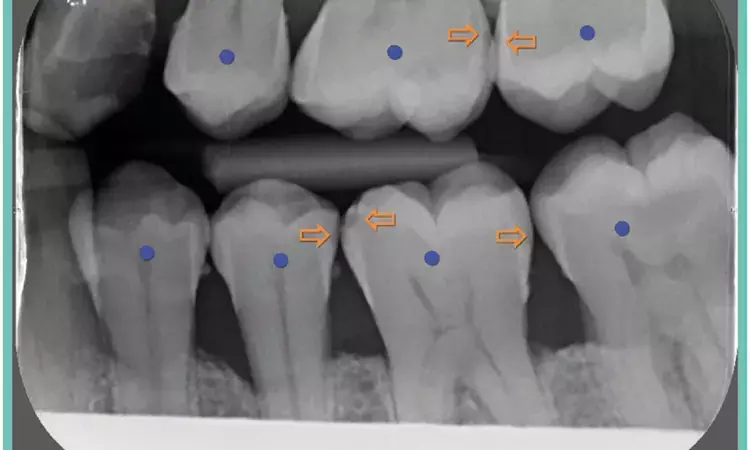- Home
- Medical news & Guidelines
- Anesthesiology
- Cardiology and CTVS
- Critical Care
- Dentistry
- Dermatology
- Diabetes and Endocrinology
- ENT
- Gastroenterology
- Medicine
- Nephrology
- Neurology
- Obstretics-Gynaecology
- Oncology
- Ophthalmology
- Orthopaedics
- Pediatrics-Neonatology
- Psychiatry
- Pulmonology
- Radiology
- Surgery
- Urology
- Laboratory Medicine
- Diet
- Nursing
- Paramedical
- Physiotherapy
- Health news
- Fact Check
- Bone Health Fact Check
- Brain Health Fact Check
- Cancer Related Fact Check
- Child Care Fact Check
- Dental and oral health fact check
- Diabetes and metabolic health fact check
- Diet and Nutrition Fact Check
- Eye and ENT Care Fact Check
- Fitness fact check
- Gut health fact check
- Heart health fact check
- Kidney health fact check
- Medical education fact check
- Men's health fact check
- Respiratory fact check
- Skin and hair care fact check
- Vaccine and Immunization fact check
- Women's health fact check
- AYUSH
- State News
- Andaman and Nicobar Islands
- Andhra Pradesh
- Arunachal Pradesh
- Assam
- Bihar
- Chandigarh
- Chattisgarh
- Dadra and Nagar Haveli
- Daman and Diu
- Delhi
- Goa
- Gujarat
- Haryana
- Himachal Pradesh
- Jammu & Kashmir
- Jharkhand
- Karnataka
- Kerala
- Ladakh
- Lakshadweep
- Madhya Pradesh
- Maharashtra
- Manipur
- Meghalaya
- Mizoram
- Nagaland
- Odisha
- Puducherry
- Punjab
- Rajasthan
- Sikkim
- Tamil Nadu
- Telangana
- Tripura
- Uttar Pradesh
- Uttrakhand
- West Bengal
- Medical Education
- Industry
AI systems promising for diagnosis of dental caries on intraoral radiographs: Study

AI systems promising for diagnosis of dental caries on intraoral radiographs suggests a study published in the Journal of Dentistry.
This study aimed to assess the reliability of an AI-based system that assists the healthcare processes in the diagnosis of caries on intraoral radiographs. The proximal surfaces of the 323 selected teeth on the intraoral radiographs were evaluated by two independent observers using an AI-based (Diagnocat) system. The presence or absence of carious lesions was recorded during Phase 1. After 4 months, the AI-aided human observers evaluated the same radiographs (Phase 2), and the advanced convolutional neural network (CNN) reassessed the radiographic data (Phase 3). Subsequently, data reflecting human disagreements were excluded (Phase 4).
For each phase, the Cohen and Fleiss kappa values, as well as the sensitivity, specificity, positive and negative predictive values, and diagnostic accuracy of Diagnocat were calculated. Results: During the four phases, the range of Cohen kappa values between the human observers and Diagnocat were κ=0.66–1, κ=0.58–0.7, and κ=0.49–0.7. The Fleiss kappa values were κ=0.57–0.8. The sensitivity, specificity and diagnostic accuracy values ranged between 0.51–0.76, 0.88–0.97 and 0.76–0.86, respectively. The Diagnocat CNN supports the evaluation of intraoral radiographs for caries diagnosis, as determined by consensus between human and AI system observers. The study may aid in the understanding of deep learning-based systems developed for dental imaging modalities for dentists and contribute to expanding the body of results in the field of AI-supported dental radiology..
Reference:
Viktor Szabó, Bence Tamás Szabó, Kaan Orhan, Dániel Sándor Veres, David Manulis, Matvey Ezhov, Alex Sanders. Validation of artificial intelligence application for dental caries diagnosis on intraoral bitewing and periapical radiographs, Journal of Dentistry, Volume 147, 2024, 105105, ISSN 0300-5712. https://doi.org/10.1016/j.jdent.2024.105105. (https://www.sciencedirect.com/science/article/pii/S0300571224002744)
Dr. Shravani Dali has completed her BDS from Pravara institute of medical sciences, loni. Following which she extensively worked in the healthcare sector for 2+ years. She has been actively involved in writing blogs in field of health and wellness. Currently she is pursuing her Masters of public health-health administration from Tata institute of social sciences. She can be contacted at editorial@medicaldialogues.in.
Dr Kamal Kant Kohli-MBBS, DTCD- a chest specialist with more than 30 years of practice and a flair for writing clinical articles, Dr Kamal Kant Kohli joined Medical Dialogues as a Chief Editor of Medical News. Besides writing articles, as an editor, he proofreads and verifies all the medical content published on Medical Dialogues including those coming from journals, studies,medical conferences,guidelines etc. Email: drkohli@medicaldialogues.in. Contact no. 011-43720751


